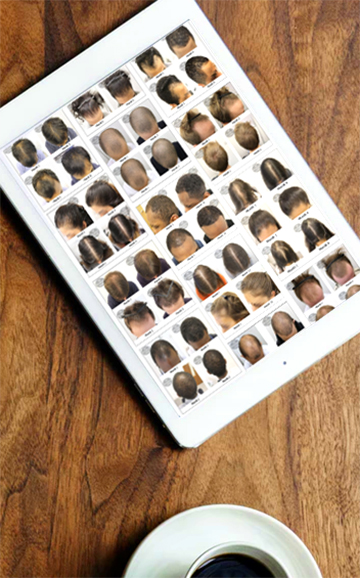Thinning Hair and Lack of Concentration Linked to Dehydration
Of all the health and wellness crazes around at the moment, the trend for toting a reusable water bottle may be one of the most beneficial.
Everyone knows it's important to keep hydrated but studies have shown that few of us actually meet the daily minimum water consumption recommendations of two litres (just over three and a half pints) per day for men, and 1.6 litres (just under three pints) per day for women.
The repercussions of this can affect everything from cognitive function to hair loss and, according to a new study, some of these effects can start to take effect in as little as two hours. Luckily, however, hair growth takes longer to be affected, giving people a chance to remedy the situation.
 A systematic review and meta-analysis of medical literature was conducted by Matthew T. Wittbrodt and Melinda Millard-Stafford of the Exercise Physiology Laboratory at the Georgia Institute of Technology's School of Biological Sciences in Atlanta.
A systematic review and meta-analysis of medical literature was conducted by Matthew T. Wittbrodt and Melinda Millard-Stafford of the Exercise Physiology Laboratory at the Georgia Institute of Technology's School of Biological Sciences in Atlanta.
The pair reviewed data from 6,591 relevant studies before narrowing it down to 33 scientific studies in order to determine the effects of dehydration as a result of physical exertion, heat and/or not drinking enough fluids, as opposed to medical-related chronic dehydration, on cognitive performance in 413 individuals. The July 2018 findings, published in the Medicine & Science in Sports & Exercise journal, conclude that dehydration 'impairs cognitive performance, particularly for tasks involving attention, executive function, and motor coordination when water deficits exceed 2% body mass loss'. It was pointed out that this level of dehydration could occur easily within two hours for people undertaking intense physical activity during warm weather, without eating or drinking - a perhaps surprisingly quick time-frame that many people may be unaware of.
“If you weigh 200 pounds and you go work out for a few of hours, you drop four pounds, and that’s 2 percent body mass,” said study author, Professor Mindy Millard-Stafford. “With an hour of moderately intense activity, with a temperature in the mid-80s, and moderate humidity, it’s not uncommon to lose a little over 2 pounds of water. If you do 12-hour fluid restriction, nothing by mouth, for medical tests, you’ll go down about 1.5 percent. Twenty-four hours fluid restriction takes most people about 3 percent down. If you drop 4 or 5 percent, you’re going to feel really crummy. Water is the most important nutrient.”
“The simplest reaction time tasks were least impacted, even as dehydration got worse, but tasks that require attention were quite impacted. Maintaining focus in a long meeting, driving a car, a monotonous job in a hot factory that requires you to stay alert are some of them. Higher-order functions like doing math or applying logic also dropped off. There’s already a lot of quantitative documentation that if you lose 2 percent in water it affects physical abilities like muscle endurance or sports tasks and your ability to regulate your body temperature... We wanted to see if that was similar for cognitive function.”
This backs many other research projects findings, including a 2015 study published in the Nursing Times which concluded that dehydration negatively affected staff performance, and a 2011 trial published in the Journal of Nutrition, which demonstrated that, 'in healthy young women, mild levels of dehydration result in adverse changes in key mood states such as vigor and fatigue as well as increased headaches and difficulty concentrating, without substantially altering key aspects of cognitive performance.'
An August 2018 blind study, also published in the Medicine & Science in Sports & Exercise journal, it was stated that dehydration impaired cycling performance, regardless of whether the cyclist actually felt thirsty or not.
 Click to View Belgravia Hair Loss Treatment Success Stories for Men and Women (Results May Vary and Are Not Guaranteed)
Click to View Belgravia Hair Loss Treatment Success Stories for Men and Women (Results May Vary and Are Not Guaranteed)
A widely-cited American review of water, dehydration and thirst conduction from 2010 that was published in the Oxford Academic journal 'Nutrition Reviews' noted, 'Given the importance of water to our health and of caloric beverages to our total energy intake and potential risks of nutrition-related non communicable diseases, understanding both the requirements for water related to energy requirements, and the differential effects of water vs. other caloric beverages remain important outstanding issues.... this review has attempted to provide some sense of the importance of water to our health, its role in relationship to the rapid increases of obesity and other related diseases, and our gaps in understanding measurement and requirements'.
Good hydration levels are important for all bodily functions, including the hair growth cycle. When the body is chronically dehydrated it may result in hair loss as fewer healthy new hairs are produced to replace those shed as a normal part of this cycle. In order to ensure the critical functions are maintained, when the body senses severe levels of dehydration it diverts its resources towards these - the heart, lungs etc - and away from less important functions, such as hair growth.
This presents outwardly as thinning hair all over the scalp from a temporary hairloss condition known as Telogen Effluvium when it lasts for up to six months, and Chronic Telogen Effluvium or Diffuse Thinning when it lasts longer. These conditions can, in turn, exacerbate existing active cases or trigger premature hereditary hair loss - Male Pattern Baldness and Female Pattern Hair Loss - in people with the relevant underlying genetic predisposition. Examples of Belgravia clients with each of these conditions, taken before and after starting their custom courses, can be seen by clicking the Success Stories image pictured.
Furthermore, as water makes up a quarter of each hair strand, it this is depleted, the hair can become dry and brittle, making it look dull and prone to breakage. This is where the hair snaps along the shaft, leaving it looking thin and frazzled.
Once normal, optimal hydration has been re-established, hair shedding should subside naturally, though certain treatments may help accelerate this process. In cases of hair breakage, a good trim and some TLC in the form of intensive conditioning treatments can help the hair to look healthier. In each instance it is also wise to establish good nutrition to boost hair health from the inside. Whilst unintended to replace a balanced diet, highly-targeted hair supplements, such as Belgravia's exclusive one-a-day Hair Vitalics, can be taken to help support this approach.
Everyone knows it's important to keep hydrated but studies have shown that few of us actually meet the daily minimum water consumption recommendations of two litres (just over three and a half pints) per day for men, and 1.6 litres (just under three pints) per day for women.
The repercussions of this can affect everything from cognitive function to hair loss and, according to a new study, some of these effects can start to take effect in as little as two hours. Luckily, however, hair growth takes longer to be affected, giving people a chance to remedy the situation.
Dehydration's effects on the brain and body
The pair reviewed data from 6,591 relevant studies before narrowing it down to 33 scientific studies in order to determine the effects of dehydration as a result of physical exertion, heat and/or not drinking enough fluids, as opposed to medical-related chronic dehydration, on cognitive performance in 413 individuals. The July 2018 findings, published in the Medicine & Science in Sports & Exercise journal, conclude that dehydration 'impairs cognitive performance, particularly for tasks involving attention, executive function, and motor coordination when water deficits exceed 2% body mass loss'. It was pointed out that this level of dehydration could occur easily within two hours for people undertaking intense physical activity during warm weather, without eating or drinking - a perhaps surprisingly quick time-frame that many people may be unaware of.
“If you weigh 200 pounds and you go work out for a few of hours, you drop four pounds, and that’s 2 percent body mass,” said study author, Professor Mindy Millard-Stafford. “With an hour of moderately intense activity, with a temperature in the mid-80s, and moderate humidity, it’s not uncommon to lose a little over 2 pounds of water. If you do 12-hour fluid restriction, nothing by mouth, for medical tests, you’ll go down about 1.5 percent. Twenty-four hours fluid restriction takes most people about 3 percent down. If you drop 4 or 5 percent, you’re going to feel really crummy. Water is the most important nutrient.”
“The simplest reaction time tasks were least impacted, even as dehydration got worse, but tasks that require attention were quite impacted. Maintaining focus in a long meeting, driving a car, a monotonous job in a hot factory that requires you to stay alert are some of them. Higher-order functions like doing math or applying logic also dropped off. There’s already a lot of quantitative documentation that if you lose 2 percent in water it affects physical abilities like muscle endurance or sports tasks and your ability to regulate your body temperature... We wanted to see if that was similar for cognitive function.”
This backs many other research projects findings, including a 2015 study published in the Nursing Times which concluded that dehydration negatively affected staff performance, and a 2011 trial published in the Journal of Nutrition, which demonstrated that, 'in healthy young women, mild levels of dehydration result in adverse changes in key mood states such as vigor and fatigue as well as increased headaches and difficulty concentrating, without substantially altering key aspects of cognitive performance.'
An August 2018 blind study, also published in the Medicine & Science in Sports & Exercise journal, it was stated that dehydration impaired cycling performance, regardless of whether the cyclist actually felt thirsty or not.
A widely-cited American review of water, dehydration and thirst conduction from 2010 that was published in the Oxford Academic journal 'Nutrition Reviews' noted, 'Given the importance of water to our health and of caloric beverages to our total energy intake and potential risks of nutrition-related non communicable diseases, understanding both the requirements for water related to energy requirements, and the differential effects of water vs. other caloric beverages remain important outstanding issues.... this review has attempted to provide some sense of the importance of water to our health, its role in relationship to the rapid increases of obesity and other related diseases, and our gaps in understanding measurement and requirements'.
Contributes to thinning hair and hair loss
Good hydration levels are important for all bodily functions, including the hair growth cycle. When the body is chronically dehydrated it may result in hair loss as fewer healthy new hairs are produced to replace those shed as a normal part of this cycle. In order to ensure the critical functions are maintained, when the body senses severe levels of dehydration it diverts its resources towards these - the heart, lungs etc - and away from less important functions, such as hair growth.
This presents outwardly as thinning hair all over the scalp from a temporary hairloss condition known as Telogen Effluvium when it lasts for up to six months, and Chronic Telogen Effluvium or Diffuse Thinning when it lasts longer. These conditions can, in turn, exacerbate existing active cases or trigger premature hereditary hair loss - Male Pattern Baldness and Female Pattern Hair Loss - in people with the relevant underlying genetic predisposition. Examples of Belgravia clients with each of these conditions, taken before and after starting their custom courses, can be seen by clicking the Success Stories image pictured.
Furthermore, as water makes up a quarter of each hair strand, it this is depleted, the hair can become dry and brittle, making it look dull and prone to breakage. This is where the hair snaps along the shaft, leaving it looking thin and frazzled.
Once normal, optimal hydration has been re-established, hair shedding should subside naturally, though certain treatments may help accelerate this process. In cases of hair breakage, a good trim and some TLC in the form of intensive conditioning treatments can help the hair to look healthier. In each instance it is also wise to establish good nutrition to boost hair health from the inside. Whilst unintended to replace a balanced diet, highly-targeted hair supplements, such as Belgravia's exclusive one-a-day Hair Vitalics, can be taken to help support this approach.

The Belgravia Centre
The Belgravia Centre is a world-renowned group of a hair loss clinic in Central London, UK. If you are worried about hair loss you can arrange a free consultation with a hair loss expert or complete our Online Consultation from anywhere in the world for home-use treatment.
View our Hair Loss Success Stories, which includes the world's largest gallery of hair growth photos and demonstrates the level of success that so many of Belgravia's patients achieve.


